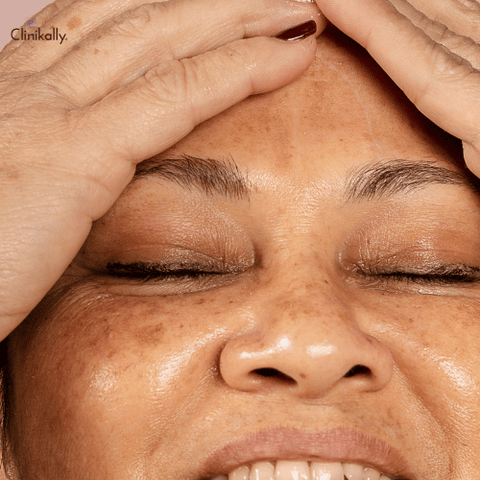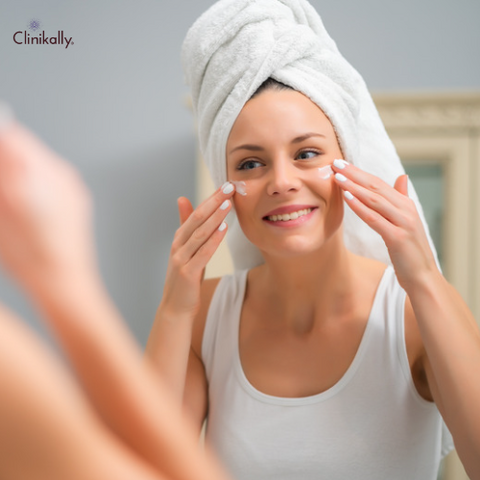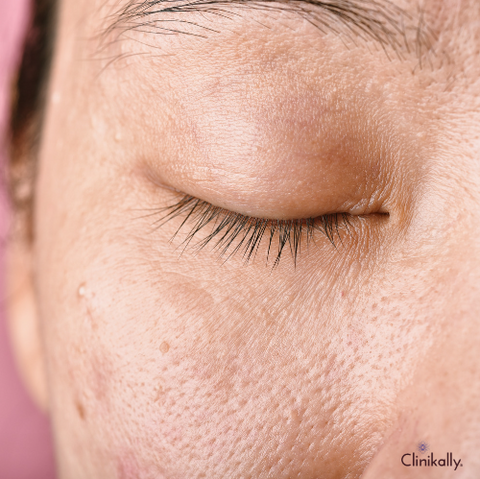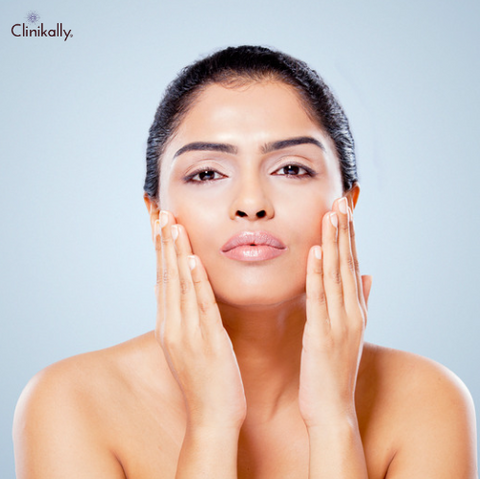If you suffer from flaky facial skin, you are not alone. Flaky skin is a common skin condition that affects people of all ages and skin types. While flaky skin can be caused by a variety of factors, dandruff and rosacea are two of the most common culprits. In this guide, we will explore the causes of flaky skin and how to treat it.
Understanding Flaky Skin and Its Causes

Flaky skin is a condition that occurs when the skin on your face becomes dry, itchy, and begins to peel. There are many factors that can contribute to flaky skin, including genetics, weather, diet, and skincare routine. In addition to these factors, dandruff and rosacea can also contribute to flaky skin.
Causes of Flaky Facial Skin
Dry skin is one of the most common causes of flaky skin. When your skin lacks moisture, it can become dry, itchy, and begin to flake. Other causes of flaky skin include harsh soaps and skincare products, hot showers, and weather conditions like wind, cold temperatures, and low humidity.
How Dandruff and Rosacea Contribute to Flaky Skin
Dandruff is a skin condition that affects the scalp, but it can also contribute to flaky skin on the face. Dandruff is caused by an overgrowth of yeast on the scalp, which can lead to redness, itching, and flaking. When dandruff flakes fall onto the face, they can cause flaky skin.
Rosacea is a skin condition that causes redness and inflammation on the face. While rosacea does not directly cause flaky skin, it can contribute to it by causing dryness and irritation.
Treating Flaky Skin

If you suffer from flaky skin, there are several things you can do to treat it. Here are some tips to help you manage your flaky skin:
Skincare Routine for Flaky Skin
One of the most important things you can do to manage flaky skin is to establish a consistent skincare routine. This should include gentle cleansers, moisturizers, and exfoliants.
Moisturizing for Flaky Skin
Moisturizing is an essential part of any skincare routine, especially for those with flaky skin. Look for moisturizers that contain ingredients like hyaluronic acid, shea butter, and aloe vera, which can help soothe and hydrate the skin.
Exfoliating for Flaky Skin
Exfoliating can also help to manage flaky skin by removing dead skin cells and promoting cell turnover. However, it is important to choose a gentle exfoliant that won't irritate the skin further. Look for exfoliants that contain ingredients like alpha-hydroxy acids or beta-hydroxy acids.
Anti-Inflammatory Skincare
Flaky skin can be caused by inflammation, so using anti-inflammatory skincare products can be helpful. Look for products that contain ingredients like green tea, which has anti-inflammatory properties.
Anti-Fungal Treatment for Dandruff
If dandruff is contributing to your flaky skin, using an anti-fungal treatment like ketoconazole shampoo can be helpful. This can help to reduce the overgrowth of yeast on the scalp, which can in turn reduce flaky skin on the face.
Anti-Bacterial Treatment for Rosacea
If you have rosacea, using an anti-bacterial treatment like metronidazole can be helpful. This can help to reduce inflammation and redness, which can in turn reduce dryness and flakiness.
Tips for Managing Flaky Skin

In addition to establishing a consistent skincare routine and using the right products, there are some other tips that can help you manage flaky skin:
Gentle Cleansers for Flaky Skin
Using gentle cleansers is important for those with flaky skin, as harsh cleansers can strip the skin of its natural oils and contribute to dryness and flaking. Look for cleansers that are fragrance-free and formulated for sensitive skin.
Avoiding Triggers for Rosacea
If you have rosacea, it's important to avoid triggers that can cause flare-ups. These can include spicy foods, alcohol, and extreme temperatures. By avoiding these triggers, you can help to reduce inflammation and dryness on the skin.
Supplements and Natural Remedies for Flaky Skin

Supplements and natural remedies can also play a significant role in managing flaky skin. Omega-3 fatty acids, for instance, are essential fats that can help to improve skin health by reducing inflammation and hydrating the skin. You can obtain omega-3s from foods like salmon, sardines, and chia seeds, or from supplements.
Omega-3 for Flaky Skin
One of the ways that omega-3s can benefit the skin is by helping to improve hydration. Dry skin is often a result of a lack of moisture, and omega-3s can help to promote hydration by supporting the skin's barrier function. The skin's barrier function is responsible for keeping moisture in and harmful substances out, and omega-3s can help to strengthen this barrier.
Omega-3s can also help to reduce inflammation, which is important for managing skin conditions like eczema, psoriasis, and rosacea. Inflammation can lead to dryness, redness, and irritation, which can contribute to flaky skin. Omega-3s have anti-inflammatory properties that can help to reduce these symptoms and improve the appearance of the skin.
In addition to improving hydration and reducing inflammation, omega-3s can also help to protect the skin from sun damage. Sun damage can lead to premature aging, hyperpigmentation, and an increased risk of skin cancer. Omega-3s can help to protect the skin from UV damage by reducing inflammation and improving the skin's natural defences.
Vitamin D for Flaky Skin
Vitamin D is another essential nutrient for skin health. It helps to promote cell growth and repair, which can help to improve the appearance of flaky skin. The best source of vitamin D is sunlight, but you can also get it from foods like fatty fish, egg yolks, and fortified dairy products. If you have a vitamin D deficiency, your doctor may recommend taking supplements.
Probiotics for Flaky Skin
Probiotics are beneficial bacteria that live in your gut and help to keep your digestive system healthy. Research has also shown that probiotics can have a positive impact on skin health by improving gut health. Certain strains of probiotics, like lactobacillus and Bifidobacterium, can help to reduce inflammation and promote hydration, which can help to manage flaky skin. You can get probiotics from foods like yogurt, kefir, and fermented vegetables, or from supplements.
Hyaluronic Acid for Flaky Skin
Hyaluronic acid is a natural substance that is found in the skin and helps to keep it hydrated. As we age, our skin produces less hyaluronic acid, which can lead to dryness and flakiness. Using skincare products that contain hyaluronic acid can help to improve skin hydration and reduce flakiness.
Zinc for Flaky Skin
Zinc is an essential mineral that plays a key role in skin health. It helps to reduce inflammation, promote wound healing, and regulate oil production. You can get zinc from foods like oysters, pumpkin seeds, and beef, or from supplements. However, it's important not to take too much zinc, as high doses can be harmful.
Green Tea for Flaky Skin
Green tea is a powerful antioxidant that can help to reduce inflammation and protect the skin from damage. Research has shown that green tea extract can help to improve the appearance of flaky skin by reducing inflammation and promoting hydration. Look for skincare products that contain green tea extract or consider drinking green tea regularly.
Aloe Vera for Flaky Skin
Aloe vera is a natural moisturizer that has been used for centuries to soothe and hydrate the skin. It contains compounds that help to reduce inflammation and promote wound healing. Look for skincare products that contain aloe vera gel or consider using aloe vera gel directly on your skin.
Shea Butter for Flaky Skin
Shea butter is a natural moisturizer that is rich in fatty acids and vitamins. It helps to soothe and hydrate the skin, making it an ideal ingredient for managing flaky skin. Look for skincare products that contain shea butter or consider using pure shea butter on your skin.
Conclusion

In conclusion, flaky skin is a common skin condition that affects many people, and can be caused by a variety of factors including dandruff, rosacea, and other skin conditions. While it can be frustrating and uncomfortable, there are many treatments and remedies that can help to manage flaky skin.
One of the most important things you can do to manage flaky skin is to establish a consistent skincare routine. This should include gentle cleansers, moisturizers, and exfoliants that are specifically formulated for dry and flaky skin. Additionally, using products that contain anti-inflammatory and anti-fungal ingredients can also be beneficial.
Avoiding triggers that can exacerbate flaky skin, such as extreme temperatures or spicy foods, can also be helpful. Making lifestyle changes such as quitting smoking or reducing stress levels can also improve skin health.
Supplements and natural remedies like omega-3s, vitamin D, and probiotics can also help to improve skin health from the inside out. These nutrients can help to promote hydration, reduce inflammation, and improve overall skin health.
It's important to note that if you have persistent flaky skin or if your condition worsens, it's best to consult with a dermatologist. They can help to identify the underlying cause of your flaky skin and develop a personalized treatment plan to manage your symptoms.
In conclusion, with the right skincare routine, lifestyle changes, and possibly incorporating supplements and natural remedies, you can manage flaky skin and improve your overall skin health. Don't hesitate to seek help from a dermatologist if you're struggling with persistent flaky skin.
































